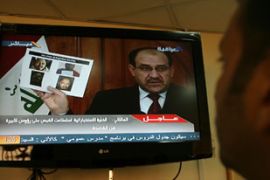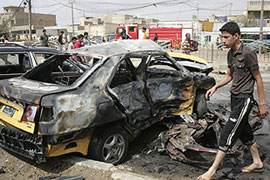Al-Qaeda in Iraq says leaders dead
Admission comes a week after joint US-Iraqi raid on a safe house near Tikrit.

Al-Mashadani was quoted as saying: “If Allah fated that the two sheikhs be killed at this particular time, know that they left a unique generation behind, one that was raised before their eyes.”
Dead in a basement
Nouri al-Maliki, the Iraqi prime minister, announced the two deaths last week, saying that a major threat to the country’s security had been removed.
Al-Masri and al-Baghdadi were found dead in a basement after their safe house about 10km outside the town of Tikrit was hit by a missile and stormed by Iraqi and US troops.
Forensic tests reportedly confirmed their identities.
 |
| A series of blasts in Baghdad in friday has been described as reprisal for the killings [Reuters] |
Al-Baghdadi had been reported killed or captured at least three times, but this is the first time al-Qaeda in Iraq has acknowledged his death.
General Ray Odierno, the US forces commander in Iraq, said in a statement that the killings were “potentially the most significant blow to al-Qaeda in Iraq since the beginning of the insurgency”.
Al-Maliki has said that a series of bombings in Baghdad on Friday that left at least 56 people dead were reprisals for the killing of al-Baghdadi and al-Masri.
But the four-page statement on the internet made no mention of the apparently co-ordinated attacks, three of which took place outside Shai mosques, and no group has yet claimed responsibility.
However, it did issue a rallying to the group’s followers.
“Transform the blood of those two leaders into light and fire; a light which will illuminate the path before you and facilitate your ability of speech, and a fire against the enemies of the creed and the religion,” the statement said.
Meanwhile, the police chief in Hawija, 240km north of Baghdad said troops raided the nearby town of al-Safra and arrested Burhan Mahmoud Mohammed, purportedly a local leader of the Islamic State of Iraq.
Colonel Fatah al-Khafaji told The Associated Press news agency that troops acted on intelligence but did not indicate exactly where the information came from.